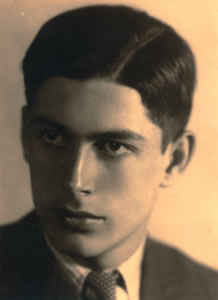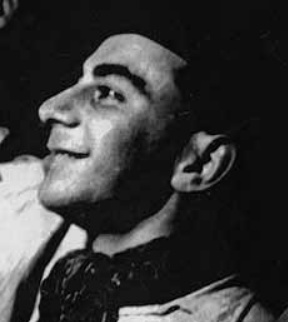
Karel Ančerl was a Czechoslovak conductor and composer, renowned especially for his performances of contemporary music and for his interpretations of music by Czech composers.

Brundibár is a children's opera by Jewish Czech composer Hans Krása with a libretto by Adolf Hoffmeister, made most famous by performances by the children of Theresienstadt concentration camp (Terezín) in occupied Czechoslovakia. The name comes from a Czech colloquialism for a bumblebee.

Kurt Gerron was a German Jewish actor and film director. He had a very successful career in cabaret and film before World War II, but was then forbidden to work and was sent to Theresienstadt Ghetto after the Nazis had occupied the Netherlands, where he and his family had fled to. He was forced by the Nazis to make a propaganda film about Theresienstadt, officially named Theresienstadt. Ein Dokumentarfilm aus dem jüdischen Siedlungsgebiet, before he and his wife, Olga Gerson-Meyer, were sent to Auschwitz concentration camp and murdered. The film was completed not long before the end of the war, but was never shown to the public, and only fragments remain.

Gideon Klein was a Czechoslovakian pianist, classical music composer, educator and organizer of cultural life at Theresienstadt concentration camp. Klein was murdered in the Holocaust.

Viktor Ullmann was a Silesia-born Austrian composer, conductor and pianist.

Hans Krása was a Czech composer. He was killed during the Holocaust at Auschwitz-Birkenau. He helped to organize cultural life in Theresienstadt concentration camp.

Rafael Schächter, was a Czechoslovak composer, pianist and conductor of Jewish origin, organizer of cultural life in Terezín concentration camp.
Shony Alex Braun was a Romanian-born Hungarian Jewish violinist, Holocaust survivor, classical composer and actor. He played bit parts in the TV shows Perry Mason, WKRP in Cincinnati and the film '68. He died of pneumonia on October 4, 2002, aged 78.
Zalman Grinberg was a medical doctor who served as the chairman for the Central Committee of Liberated Jews in the American sector of Germany and Austria after World War II.

Peter Kien was a Jewish artist and poet. He was active at the Theresienstadt concentration camp.
Maria Ajzensztadt was a Polish singer, who was murdered in the Holocaust.

Alice Herz-Sommer, also known as Alice Herz, was a Czech-born Israeli classical pianist, music teacher, and supercentenarian who survived Theresienstadt concentration camp. She lived for 40 years in Israel, before emigrating to London in 1986, where she resided until her death, and at the age of 110 was the world's oldest known Holocaust survivor until Yisrael Kristal was recognized as such.
Pavel Friedmann was a Jewish Czechoslovak poet who was murdered in the Holocaust. He received posthumous fame for his poem "The Butterfly".

The Ghetto Swingers were a jazz band organised in the Nazi concentration camp Theresienstadt.
Simon (Szymon) Laks was a Polish Jewish composer and violinist, who became head of the prisoners' orchestra at Birkenau-Auschwitz.

Antonina Maria Żabińska, néeErdman, was a Polish writer connected, through her husband Jan Żabiński, with the Warsaw Zoo. Together they smuggled out Jews from the Warsaw Ghetto and she became the The Zookeeper's Wife.

Karel Švenk, sometimes referred to in German as Karl Schwenk, was a Czech cabaret artist, comedian, songwriter and writer. A leading figure in the cabaret at the Theresienstadt Ghetto, Švenk was eventually sent to Auschwitz and later to Meuselwitz. He died on a death march from Kraslice about two weeks before the end of the war. Being completely exhausted and unable to continue, his friend hid him in the straw in the barn where the prisoners spent the night. It is unknown whether he died of exhaustion or was discovered by the SS and shot.
The Violins of Hope is a collection of Holocaust-related string instruments in Tel Aviv, Israel. The instruments serve to educate and memorialize the lives of prisoners in concentration camps through concerts, exhibitions and other projects. The collection is owned by father and son team Amnon and Avshalom Weinstein, who are both violin makers.

Ela Stein-Weissberger was a Czech Holocaust survivor who became well known for her roles as a contemporary witness and intelligence officer for the Israel Defense Forces. In her later years she traveled the world discussing her time in concentration camps during World War II. She even wrote about her experiences in a book titled The Cat with the Yellow Star: Coming of Age in Terezin.

Josima Feldschuh was a Polish pianist and composer of Jewish origin. Feldshuh was considered a child prodigy.














